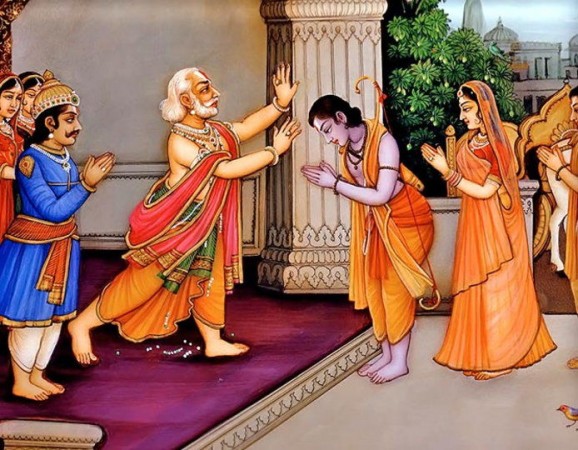
King Dasharatha was a wise and virtuous ruler of Ayodhya, a magnificent kingdom in ancient India. He was the descendant of the great Ikshvaku dynasty and was renowned for his valor, compassion, and integrity. Dasharatha was beloved by his subjects and revered as a just and fair king. The tale of King Dasharatha begins with his yearning for an heir to the throne. Despite having three queens - Kausalya, Kaikeyi, and Sumitra, Dasharatha remained childless for several years. Troubled by the absence of an heir, he decided to perform a grand yagna (sacrificial ritual) seeking blessings from the gods. As a result of the yagna, divine beings appeared and offered the king a bowl of sacred pudding, instructing him to give it to his queens to consume. Months later, the queens each gave birth to four sons.
Kausalya's eldest son was Rama, the epitome of virtue and righteousness. Kaikeyi's son was Bharata, who was deeply devoted to Rama. Sumitra gave birth to twins, Lakshmana, and Shatrughna. The four brothers grew up together, forming an inseparable bond, and became skilled in warfare, education, and arts. As time passed, Dasharatha's fondness for Rama grew immensely, and he declared Rama as his successor to the throne, a decision welcomed by the people of Ayodhya. However, destiny had other plans, and an unfortunate event unfolded. Kaikeyi's scheming maid, Manthara, filled her mind with jealousy and desire for Bharata to be the next king. Taking advantage of Dasharatha's promise to fulfill two of her boons, she manipulated Kaikeyi into demanding that Rama be exiled to the forest for fourteen years and that Bharata be crowned as king. The devoted son that he was, Rama willingly accepted his father's decree and prepared to leave Ayodhya. Sita, his devoted wife, and Lakshmana, his loyal brother, insisted on accompanying him to the forest, demonstrating their unwavering love and support. The heartbroken Dasharatha, burdened with guilt and grief, tried to convince Rama to stay. However, Rama, ever committed to his duty as a son, remained steadfast in his decision. As the departure day arrived, Dasharatha's sorrow overwhelmed him, leading to his untimely demise. The kingdom mourned the loss of their beloved king, and the guilt-stricken Kaikeyi deeply regretted her actions. In the forest, Rama, Sita, and Lakshmana lived a simple life, and Rama won the hearts of the sages and the forest dwellers with his noble character and kindness. Meanwhile, Bharata, who was unaware of the truth behind Rama's exile, returned to Ayodhya and learned of his father's death and Rama's exile. Realizing the gravity of the situation, he refused to accept the throne and decided to seek Rama in the forest to persuade him to return.
Upon meeting Rama, Bharata pleaded for him to come back and rule Ayodhya, but Rama insisted on honoring his father's word and completing the fourteen-year exile. Bharata, respecting his elder brother's virtues, took Rama's sandals back to Ayodhya and placed them on the throne, ruling the kingdom on Rama's behalf. At the end of the fourteen-year exile, Rama returned to Ayodhya, where he was joyously welcomed by the people. He was crowned as the king, and his reign brought about an era of peace, prosperity, and righteousness. The story of King Dasharatha and his noble sons, especially Rama, continues to inspire generations with its teachings of duty, sacrifice, and the triumph of good over evil. Their legacy remains immortal in the hearts of people, exemplifying the timeless values of virtue and dharma.
also read - Rishabha Avatar of Vishnu: The Divine Incarnation of Asceticism and Spiritual Enlightenment